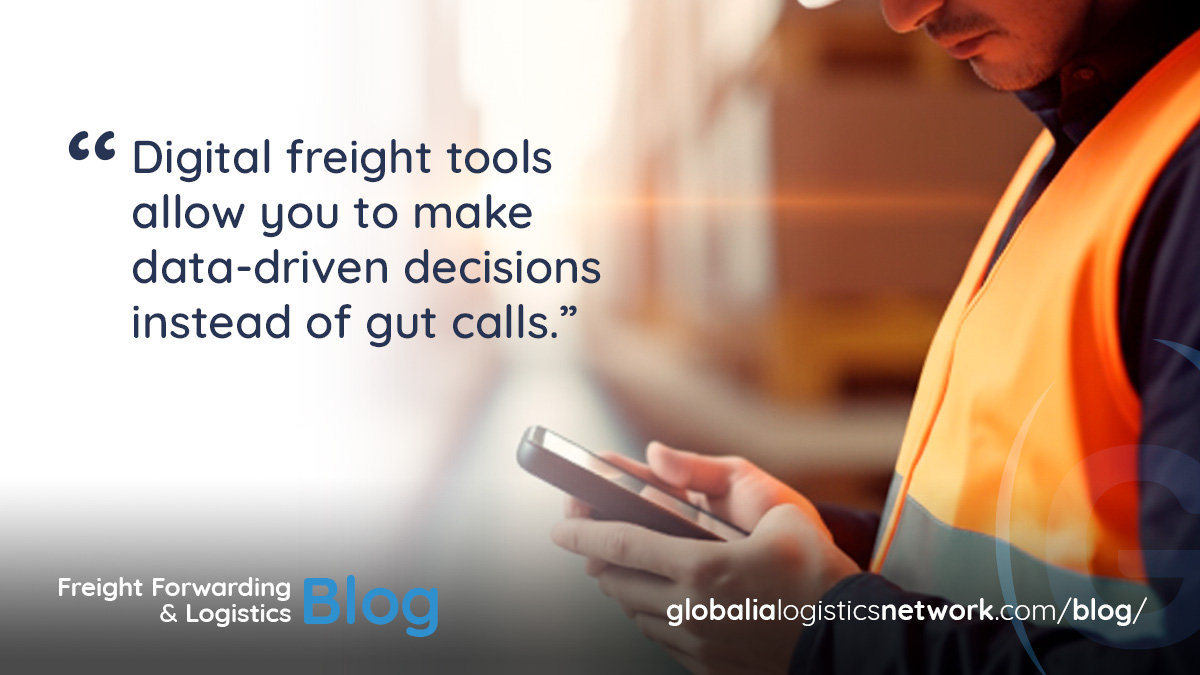There’s no polite way to say this: if you’re still running your logistics business on spreadsheets, email threads, and blind faith, you’re losing time and money. The logistics industry has gone digital, and the tools available now can automate, analyse, and anticipate faster than ever. But most of these apps aren’t free. They demand a bit of investment.
That said, joining Globalia Logistics Network can take some of that edge off. Members don’t just get access to nearly 200 pre-vetted freight forwarders worldwide and new project opportunities, they also get to use FreightViewer, Globalia’s exclusive digital quoting platform. It’s the first logistics network to offer a free instant freight rate generation tool, helping forwarders quote clients and partners online within minutes. Now, once you’ve got that in your digital toolkit, these paid apps can take your efficiency and visibility to the next level.
Let’s break down the best logistics apps 2025, the ones that actually make a difference to your daily operations.

1. Project44 – For Real-Time Visibility
In logistics, silence is costly. Project44 provides the visibility you need across the entire supply chain. From ocean to air, it integrates directly with carriers and delivers real-time shipment tracking, ETA updates, and delay alerts. If you’re dealing with missed deadlines or frustrated clients who keep asking “Where’s my cargo?”, Project44 can transform your operations. It’s one of the best logistics apps 2025 for freight agents who need accuracy without micromanagement.
2. CargoWise – The All-in-One Freight Forwarding Software
CargoWise has long been the heavy-hitter in global logistics operations. The app covers every aspect of freight forwarding software, from customs compliance and document automation to global rate management. It supports multiple languages and currencies, integrates with major carriers, and is a powerful ally for companies handling complex international shipments. Think of it as your digital command centre for freight forwarding operations, if you can afford it, it’s worth every penny.
3. Transporeon – Connecting Shippers and Carriers Seamlessly
If your daily headache involves endless phone calls between carriers, brokers, and warehouse operators, Transporeon might just save your sanity. It’s built to optimise logistics operations management by directly connecting all stakeholders in real time. You can book freight capacity, manage tenders, monitor spot rates, and get real-time shipment visibility. It also provides sustainability analytics, helping you monitor your carbon footprint—something that’s becoming crucial in today’s shipping landscape. For those exploring supply chain management apps that balance cost efficiency with transparency, Transporeon is a clear winner.
4. FourKites – Predictive Shipment Intelligence
FourKites takes visibility a step further with predictive insights. The app uses AI to forecast potential delays due to weather, congestion, or customs bottlenecks. By combining freight tracking tools and logistics technology tools, FourKites gives you actionable data before problems escalate. You can instantly alert clients, adjust routes, or reschedule deliveries. It’s one of the must-have freight forwarding tools if you’re serious about proactive logistics management. The interface is intuitive, and integration with your TMS or ERP system is smooth. It’s perfect for freight forwarders dealing with high shipment volumes or complex multimodal transport.
5. Shipwell – End-to-End Freight Management Made Simple
Shipwell brings together order management, tracking, and analytics into a single, accessible platform. It’s designed for small and mid-sized logistics firms that want enterprise-level visibility without the complexity of massive systems. It’s especially useful for teams focused on cargo management apps and improving day-to-day workflow efficiency. From quoting to dispatch to delivery confirmation, Shipwell automates repetitive tasks, freeing up time for actual client management and problem-solving. With its intuitive dashboard and clear shipment status updates, Shipwell earns its place among the best logistics apps 2025 for freight agents trying to balance control with simplicity.
Why Investing in Digital Tools is No Longer Optional
Freight forwarding isn’t getting any simpler. Port congestion, customs backlogs, and erratic shipping schedules are now part of daily life. What separates the winners from the rest is how quickly they can respond, adapt, and communicate. That’s where the tools of logistics management come into play. Digital freight tools allow you to make data-driven decisions instead of gut calls. Whether it’s monitoring KPIs, analysing transit times, or automating rate comparisons, the right tech stack turns chaos into clarity. Moreover, logistics automation software ensures consistent service levels even when your team is stretched thin. For freight forwarders managing multiple shipments across time zones, automation is no longer a luxury—it’s survival.
The Smart Forwarder’s Approach
While the apps mentioned are paid and often come with steep learning curves, the ROI they deliver is significant. They minimise human error, shorten communication loops, and give you the kind of visibility that clients now expect as standard. That said, combining these tools with network support, like Globalia Logistics Network, is what makes the difference between simply keeping up and truly growing. Globalia gives you exclusive territorial rights, direct access to vetted agents in nearly 200 cities, and visibility through online promotions. Add FreightViewer to that, and you’ve got one of the most advanced digital tools for supply chain efficiency available to independent forwarders today.


